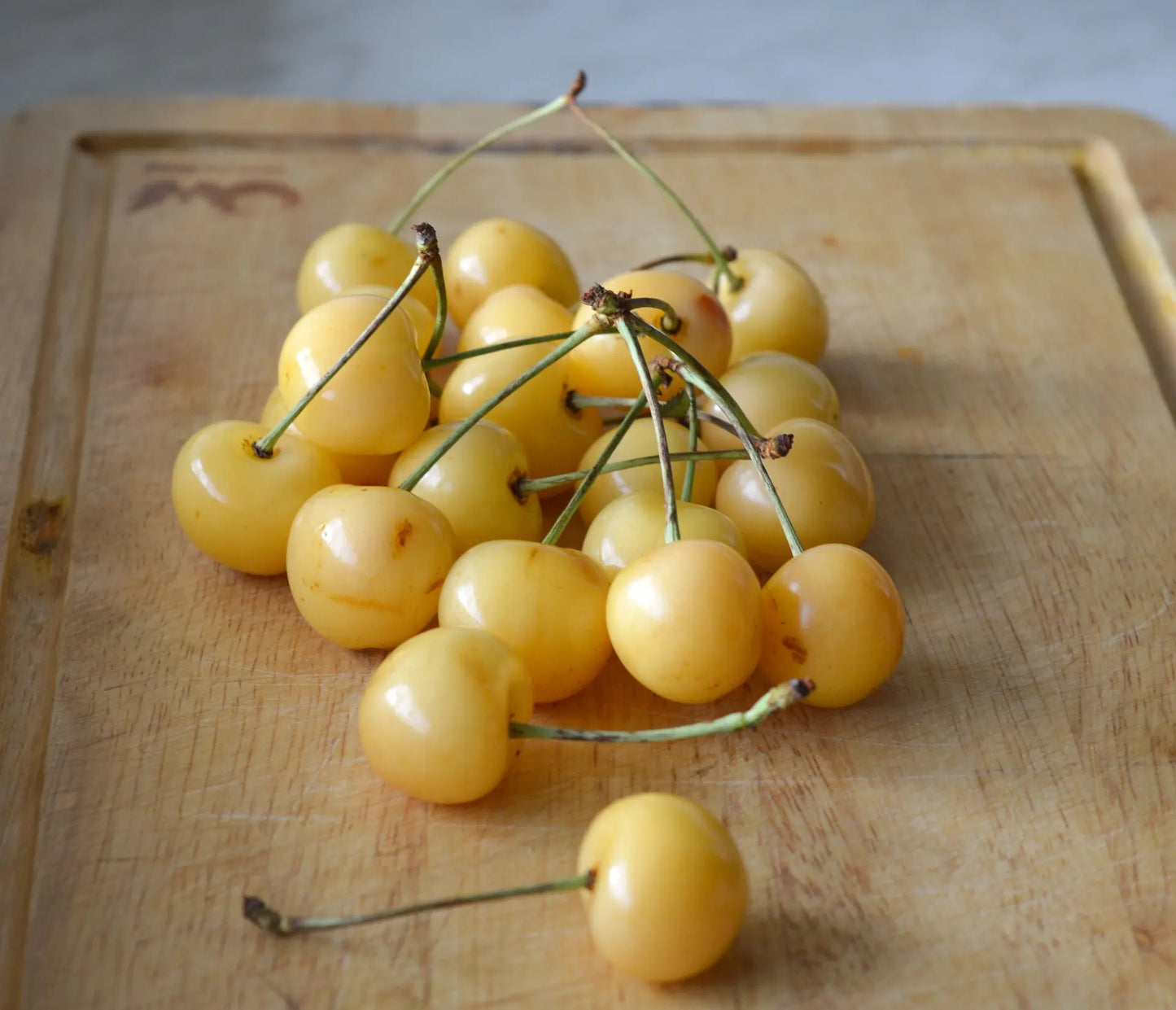-
Delivery from 10 plants to France, Switzerland and Europe
Delivery method -
Fruit Tree Wholesale Supplier
About Us -
Quality Fruit Tree Plants
Technical itinerary
Rainier Cherry High Half-Standard Tree 6-8 cm diameter bare-root
Rainier Cherry High Half-Standard Tree 6-8 cm diameter bare-root
The prices shown are our base prices for large volumes. Depending on the quantity ordered and the producers’ pricing scales, the rate may be adjusted upward. Each quote is personalized to ensure you receive a fair price.
Mini order 20 units / Multiple orders 10 units (FRS202412001)
Couldn't load pickup availability
 Buy now and get it delivered when you're ready to plant - Add your desired date to your quote request
Buy now and get it delivered when you're ready to plant - Add your desired date to your quote request
- Delivery from 10 plants to France, Switzerland and Europe

Rainier Cherry Variety Fact Sheet
- Skin color: Two-tone.
- Size and shape: Large caliber (28 mm minimum).
- Fruit taste: High sugar content.
- Commercial use: Red Label.
- Comments: Variety included in a positive list of varieties.
Quick read / Rainier Cherry essentials
The Rainier Cherry is a bicolored bigarreau variety, particularly prized for its sweet, juicy and firm flesh , as well as for its late harvest which allows producers to access a less competitive market. Obtained in 1954 in the United States by crossing the Bing and Van varieties, it is now cultivated in France for its taste quality and good conservation. Arboriverse, a specialist wholesale supplier of cherry plants, provides producers with rigorously selected plants to guarantee efficient production adapted to local conditions.
Rainier cherries have a yellow to orange-red skin , low acidity , and good resistance to splitting , making them ideal for fresh consumption, jam making, and desserts. However, this variety is self-sterile and requires cross-pollination with varieties like Napoleon or Burlat to ensure good yields. Buying Rainier cherry plants from an expert supplier ensures access to pollinator-friendly varieties and successful orchard establishment.
In terms of cultivation, the Rainier Cherry tree adapts well to well-drained soils and tolerates limestone moderately , although excess can lead to chlorosis. Good irrigation is recommended during the first few years to ensure effective rooting, after which the tree tolerates periods of drought better. Arboriverse, a specialist wholesale supplier of cherry plants, advises growers on the choice of the most suitable rootstocks, such as Maxma 60, Maxma 14 or Prunus avium , which influence vigor and productivity.
The Rainier cherry tree is susceptible to certain fungal diseases , including brown rot and shot hole , as well as black aphids and cherry fruit fly . Regular monitoring and preventative biological treatments are essential to maintain healthy production and avoid losses. Buying Rainier cherry plants from a specialist supplier ensures a choice of robust plants and better resistance to climatic and health hazards.
Presentation of the Rainier Cherry Tree for Apple Growers and Cherry Producers in France
The Rainier Cherry is a bicolored variety of cherry , native to the United States , obtained in 1954 at the University of Washington by crossing the Bing and Van varieties. Appreciated for the taste quality of its fruits , its good conservation and its hardiness , it is suitable for commercial production, particularly in organic farming, although it is susceptible to certain diseases and parasites.
Characteristics of Fruits
Rainier cherries are distinguished by their yellow to orange-red skin , sometimes slightly striped. Their flesh is firm, juicy, sweet and fragrant , offering a taste that is very popular with consumers. Their size is generally medium to large , with good resistance to bursting . Thanks to their low acidity and crunchy texture, they are ideal for fresh consumption , but also for making jams and desserts .
Flowering and Pollination
The Rainier Cherry tree is self-sterile , meaning it requires cross-pollination to produce sufficient fruit. Recommended pollinator-compatible varieties include:
- Napoleon
- Burlat
Flowering occurs in April , which can expose the flowers to late frosts in some areas. It is therefore advisable to plant the tree in a sheltered location to protect the flowering.
Growing Conditions
The Rainier Cherry tree adapts to a wide range of soils, with moderate tolerance to lime . It is important to avoid excessively calcareous soils , which could cause chlorosis . It prefers well-drained soil , slightly moist , but without excess water , to avoid root asphyxiation .
It is drought resistant , but requires regular watering during the first few years to ensure good rooting. Once well established, it tolerates dry and hot conditions better. In the Mediterranean region, occasional watering is beneficial during periods of high heat.
Resistance to Diseases and Parasites
The Rainier Cherry tree is susceptible to certain cryptogamic diseases , including:
- Brown rot , which causes flowers to dry out and fruit to rot. Regular pruning to aerate the branches and preventative treatments with Bordeaux mixture at the end of winter are recommended.
- Shot hole , which causes circular brownish spots on the leaves and lesions on the twigs. It is advisable to apply suitable fungicides and remove the affected parts.
Regarding parasites , it is particularly vulnerable to:
- Black aphids , which attack young shoots. Natural treatments such as black soap, nettle manure or the introduction of ladybugs are recommended.
- Cherry flies , which lay their eggs in fruit, making it unfit for consumption. Setting yellow chromatic traps and picking up fallen fruit can help limit the damage.
Regular monitoring and preventative biological treatments are essential to maintain a healthy orchard.
Recommended Rootstocks
The choice of rootstock is crucial for adapting Rainier cherry cultivation to local conditions. In France, the most suitable rootstocks are:
- Maxma 60 and Maxma 14 , particularly recommended for sandy soils, offering balanced growth and good fruit set.
- Wild cherry (Prunus avium) , suitable for deep, well-drained soils , but should be avoided in wet areas.
These rootstocks allow you to control the vigor of the tree and optimize production.
Harvest and Profitability
The Rainier cherry tree is a late-ripening variety , with harvesting beginning in late June or early July . This period is advantageous for producers wishing to extend the cherry season and access a less competitive market.
The fruits have good storage capacity , remaining fresh for up to a week at room temperature and 3 to 5 days in the refrigerator . For longer storage, they can be frozen or made into jams, syrups or compotes .
Its average yield is 50 to 70 kg per tree , depending on growing conditions and maintenance.
Orchard Maintenance and Management
Light pruning in late winter helps structure the tree and optimize fruiting. Thinning branches promotes better air circulation and reduces the risk of disease.
Applying a balanced fertilizer in early spring stimulates flowering and improves fruit quality. Fertilization rich in potassium and magnesium is recommended to support growth and fruiting.
Frost protection may be necessary in some areas to prevent flower loss in late frosts.
Watering must be adapted , favoring drip irrigation to maintain sufficient humidity without excess water.
Conclusion
The Rainier Cherry tree is a highly prized variety for the quality and originality of its two-tone fruit , its juicy and sweet flesh , as well as its good conservation . Its late harvest makes it a strategic option for producers wishing to extend the cherry season and take advantage of a more favorable market.
However, it requires cross-pollination , careful monitoring against diseases and pests , and well-drained soil to avoid root asphyxiation. With careful management and appropriate cultural practices, it offers attractive profitability for professional orchards.
To summarize: Rainier Cherry
The Rainier Cherry is a bicolored bigarreau variety highly sought after for its sweet flesh, firmness and excellent taste . With a late harvest in late June-early July, it allows growers to extend the cherry season and access a more profitable market. However, being self-sterile , it must be grown alongside pollinating varieties such as Napoléon or Burlat to ensure optimal production. Arboriverse, a specialist wholesale supplier of cherry plants, offers high-quality plants to optimize orchard performance.
The Rainier cherry tree adapts well to well-drained soils , with moderate tolerance to limestone , and prefers controlled watering to avoid water stress. Choosing the right rootstock is essential to regulate its growth and improve fruit set: Maxma 60, Maxma 14 or Prunus avium are among the most recommended. Buying Rainier cherry plants from an expert allows you to access the best selections for successful planting and optimized production.
In terms of protection, this variety is susceptible to fungal diseases (brown rot, shot hole) and pests (black aphids, cherry flies). Rigorous management, including regular pruning, branch thinning, and organic preventative treatments, is essential to preserve fruit quality. Arboriverse, a specialist wholesale supplier of cherry plants, supports growers with solutions tailored to their needs.
With an average yield of 50 to 70 kg per tree , excellent storage quality and attractive market value , the Rainier cherry tree represents a profitable investment for apple growers. Buying Rainier cherry plants from a specialist supplier guarantees reliable, high-quality production that meets the demands of the premium cherry market.
-
Rainier Cherry Scion bare-root organic
Regular price €13,85 EURRegular priceUnit price / per -
Rainier Cherry Scion bare-root
Regular price €10,40 EURRegular priceUnit price / per -
Rainier Cherry Scion bare-root
Regular price €11,72 EURRegular priceUnit price / per -
Rainier Cherry Spindle Tree bare-root
Regular price €13,66 EURRegular priceUnit price / per -
Rainier Cherry High Half-Standard Tree 6-8 cm diameter bare-root
Regular price €20,44 EURRegular priceUnit price / per -
Rainier Cherry Half-Standard Tree 8-10 cm diameter bare-root
Regular price €22,70 EURRegular priceUnit price / per



